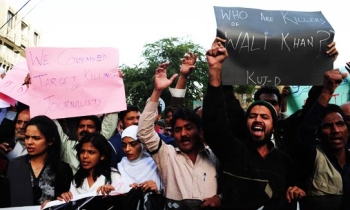Yet another journalist has been handed down a prison sentence for defamation. On March 7, a court in Giza near Cairo convicted Amira Malash, a reporter for the independent weekly Al-Fagr, of defaming Judge Attia Mohammad Awad in an article she wrote in July 2005 alleging that he had taken bribes.
 WATCH OUT: German Chancellor Angela Merkel, right, and Egypt President Hosni Mubarak brief the media after a meeting at the Chancellery in Berlin on Saturday, March 11, 2006. Press freedom and human rights organisations have called on President Mubarak to fulfill his promise, made in 2004, to fight attacks on press freedom and annul prison sentences in cases to do with the press. (AP Photo/Markus Schreiber)
WATCH OUT: German Chancellor Angela Merkel, right, and Egypt President Hosni Mubarak brief the media after a meeting at the Chancellery in Berlin on Saturday, March 11, 2006. Press freedom and human rights organisations have called on President Mubarak to fulfill his promise, made in 2004, to fight attacks on press freedom and annul prison sentences in cases to do with the press. (AP Photo/Markus Schreiber)"The sentencing of our colleague Amira Malash spotlights President (Hosni) Mubarak's complete failure to eliminate criminal penalties in cases of defamation and other press offenses" Committee to Protect Journalists (CPJ) Executive Director Ann Cooper said. "Two journalists have been convicted in the past two weeks revealing a continued disregard for freedom of expression in Egypt."
Malash insisted that her story was based on an official enquiry. "I will appeal this unfair verdict," she said, adding, "I am deeply shocked, because I had faith in the justice system." Malash said that her verdict was handed down after a summary eight-minute hearing and that the judge did not even listen to defence arguments. "At a time when we have freedom of expression in Egypt, this verdict is wrecking everything," she said, acording to Associated Press. "Freedom of the press in Egypt ... is collapsing."
Ahmed al-Sayyid, spokesperson for regional NGO Arab Press Freedom Watch, said "Analysts who had predicted greater freedom for reporters have been proved wrong. Recent months of relative calm on the press front were merely coincidental. There are dozens of charges against journalists waiting to be heard in court."
The Egyptian Organisation for Human Rights (EOHR) expressed "its great concern at the strict application of laws that limit freedom of expression and impose prison terms in cases involving the press". The Egyptian Association of Support for Democratic Development issued a statement calling for the immediate annulment of the verdict against Amira Malash. The two organisations also called on President Mubarak to fulfill his promise, made in 2004, to fight attacks on press freedom and annul prison sentences in cases to do with the press.
"Analysts who had predicted greater freedom for reporters have been proved wrong," al-Sayyid told Reuters. "Recent months of relative calm on the press front were merely coincidental. There are dozens of charges against journalists waiting to be heard in court." According to al-Sayyid, the threat of imprisonment for press offences ultimately serves to diminish the quality of Egyptian journalism in general. "Such laws have a negative effect, not only on journalists, but also on the reporting they produce," he said.
 THE BROTHERHOOD: Members of the Egyptian Muslim Brotherhood hold a demonstration to protest about the recent controversy over cartoons of the Prophet Mohammed, and call for a boycott of Danish milk products, outside the Lawyers Syndicate in Cairo. The government last week shut down Afaq Arabiya, a newspaper known as the mouthpiece of the Muslim Brotherhood and reportedly arrested 27 of its members. (AP Photo/Ben Curtis)
THE BROTHERHOOD: Members of the Egyptian Muslim Brotherhood hold a demonstration to protest about the recent controversy over cartoons of the Prophet Mohammed, and call for a boycott of Danish milk products, outside the Lawyers Syndicate in Cairo. The government last week shut down Afaq Arabiya, a newspaper known as the mouthpiece of the Muslim Brotherhood and reportedly arrested 27 of its members. (AP Photo/Ben Curtis)On February 23, a Cairo criminal appeals court upheld the conviction and one-year prison sentence of Abdel Nasser al-Zuheiry, a reporter for the independent daily Al Masry al-Youm (Egypt Today). Al-Zuheiry had lodged the appeal along with two colleagues at the paper, Alaa al-Ghatrifi, and Youssef al-Oumi, who had been convicted of the same offence and also sentenced to a year in jail. The court overturned their convictions. It upheld fines of E�10,001 (US$1,743) for all three journalists
The Egyptian Journalists' Syndicate and Al-Fagr said they planned to appeal Malash's conviction. Malash is not currently in jail. Wael Abdelfatah, deputy editor-in-chief of al-Fagr, told CPJ, "The court held one session, which lasted only eight minutes, before issuing the verdict against Amira Malash in absentia." He added, "The judge verbally attacked the Egyptian press in his ruling. The profession of journalism is in danger."
CPJ wrote a letter to Egyptian President Hosni Mubarak urging him to fulfill a commitment he made two years ago to introduce legislation that would decriminalise press offenses. The 1996 Press Law, which is still in effect, prescribes prison sentences of up to two years for defamation. The penal code can be used to imprison journalists for "violating public morality" and "damaging national interest."
Meanwhile, the Egyptian government last week shut down a newspaper known as the mouthpiece of the Muslim Brotherhood and reportedly arrested 27 members in the latest crackdown on the influential Islamist group. The closure of the Afaq Arabiya - "Arab Horizons" - newspaper Wednesday last and the arrests throughout the week came as the government struggled to curb the growing popularity of the Muslim Brotherhood, whose legislative influence and wide support make it the leading opposition force in Egypt.
Religious groups and political scientists in Cairo complained that the Bush administration's calls for regional reform grow silent when it comes to Islamist parties, allowing authoritarian regimes to tout cosmetic changes without making true reforms. The Brotherhood is officially banned, but it fielded independent candidates who won 88 seats in last year's parliamentary elections.









